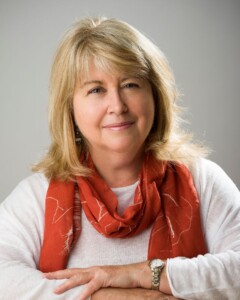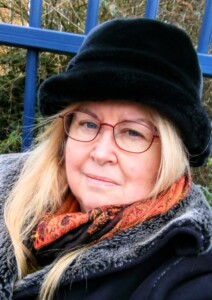Janet Gover’s Vulval Cancer Story
 I wanted to write my cancer story in the hope of helping other women, but now I come to do it, it’s harder than I expected. Any cancer story is hard… I know that. But cancer of the vulva is hard on two counts. It strikes right at the core of my identity as a woman. It’s also very, very embarrassing… and it should not be. Let me say that again. It should NOT be. Ever.
I wanted to write my cancer story in the hope of helping other women, but now I come to do it, it’s harder than I expected. Any cancer story is hard… I know that. But cancer of the vulva is hard on two counts. It strikes right at the core of my identity as a woman. It’s also very, very embarrassing… and it should not be. Let me say that again. It should NOT be. Ever.
As Julie Andrews would advise – let’s start at the very beginning.
As an Australian (transplanted to the UK 20 years ago) I am very aware of the danger the sun poses. I suffer from intermittent skin cancers – basal cell carcinomas that are annoying but not lethal. I’d heard the word melanoma used in relation to the lethal form of skin cancer… but I had escaped that.
As I entered my late fifties, I started experiencing discomfort around my vagina and pain during sex. When I talked to my GP, menopause was the diagnosis and thus we started HRT. Nothing changed. Give it time, I was told. I did. Lots of time. After all, menopause is like that, isn’t it? It’s normal. Don’t make a fuss, I told myself.
No – it’s not normal and it wasn’t. While applying a cream to my vagina, I felt a lump. With my experience of skin cancer, I am wary of lumps. So was my GP when she saw it. I was fast tracked. She did warn me that ‘the c word’ might be used, but not to panic. I, of course, panicked, just a bit.
Sent to St Peters in Ashford at the end of November 2019, I had a punch biopsy at the very first appointment. ‘Punch biopsy’ is not something you ever want to hear from your gynaecologist, but they were important words because when I went to get the results, I was told it was stage 2 melanoma. That was a few days before Christmas.
How, I wondered, did one get skin cancer in a part of the body that had never been exposed to the sun? But of course, melanoma is more than just something caused by sun damage.
Don’t assume any issues with your vagina and vulva are just menopause and you have to live with it. Don’t tell yourself not to make a fuss. Don’t be afraid to ask your GP for a fuller examination. Say the words.
I had never heard of cancer of the vulva until that moment. I cannot give enough thanks to the team at St Peters and St Luke’s cancer centre in Guildford, and in particular my nurse specialists. They held me together when all I wanted to do was hide under the bed and pretend this wasn’t happening. They helped me understand this form of the disease. I didn’t stop being scared, but I dealt with the fear in whatever way I had to at each moment.
My never-ending gratitude goes to my husband who never let go of my hand (except for when the doctors told him he had to).
The next week, I was having Christmas dinner with my husband and his family. How do you tell your mother- and father-in-law that you have cancer “there“? The answer is – you just tell them. My in-laws were wonderful. My father-in-law is a cancer survivor. So is my sister-in-law. Their support was unflinching and it was a chance to talk to someone who had been there – a different there – but they both understood.
 I leaned on those closest to me as I had the MRI, the pre-surgery assessment and surgery to remove the lump and lymph nodes (to check for a spread of the disease) in January – about a month after the diagnosis. The test results were the best they could possibly be. I didn’t need chemo or radiation. Close monitoring for the next few years, of course, but no chemo. The hardest part of the recovery has been coming to terms with the fact that things are different in my most intimate place. I am a different shape due to sections of the labia being cut away. But I am cancer free… that’s what matters.
I leaned on those closest to me as I had the MRI, the pre-surgery assessment and surgery to remove the lump and lymph nodes (to check for a spread of the disease) in January – about a month after the diagnosis. The test results were the best they could possibly be. I didn’t need chemo or radiation. Close monitoring for the next few years, of course, but no chemo. The hardest part of the recovery has been coming to terms with the fact that things are different in my most intimate place. I am a different shape due to sections of the labia being cut away. But I am cancer free… that’s what matters.
Very few people noticed my absence from daily life as I recovered from surgery that took far more out of me than I expected. I guess I have Covid to thank for that, but eventually I had to talk to people again… and tell them something.
I came up with a couple of humorous anecdotes. I laughed at the burst water pipe that saw part of the hospital ceiling collapse in front of me (true). I jokingly suggested that the reason I was moved from my room at one stage was to create an isolation room for our first Covid 19 case (possibly true). I found lots of ways to deflect the issue. But I shouldn’t be doing that. And I have stopped now (although the stories are very funny).
This is what I say now.
I had cancer of the vulva – yes, it is a real thing that most of us know nothing about. I was lucky – I caught it early, but others are not so lucky because we, as women, tend to be too embarrassed to talk about it. I know women who whisper the words vagina and menopause, even if they are only talking to other women, because we have been taught that you don’t discuss such things in polite conversation.
Yes – discuss it. Please discuss it.
Don’t assume any issues with your vagina and vulva are just menopause and you have to live with it. Don’t tell yourself not to make a fuss. Don’t be afraid to ask your GP for a fuller examination. Say the words. It is heart-breaking that some lives are lost to this disease because of ignorance. It’s totally unforgiveable if a single life is lost due to embarrassment or shame.
And finally – I want to say something about our wonderful NHS. Of course it’s not perfect, but I have seen how healthcare works in many countries around the world. We are so fortunate to have the NHS. It deserves support and proper funding from our governments. The people who work for it deserve our support, our thanks and our respect.
They also have my undying gratitude.

